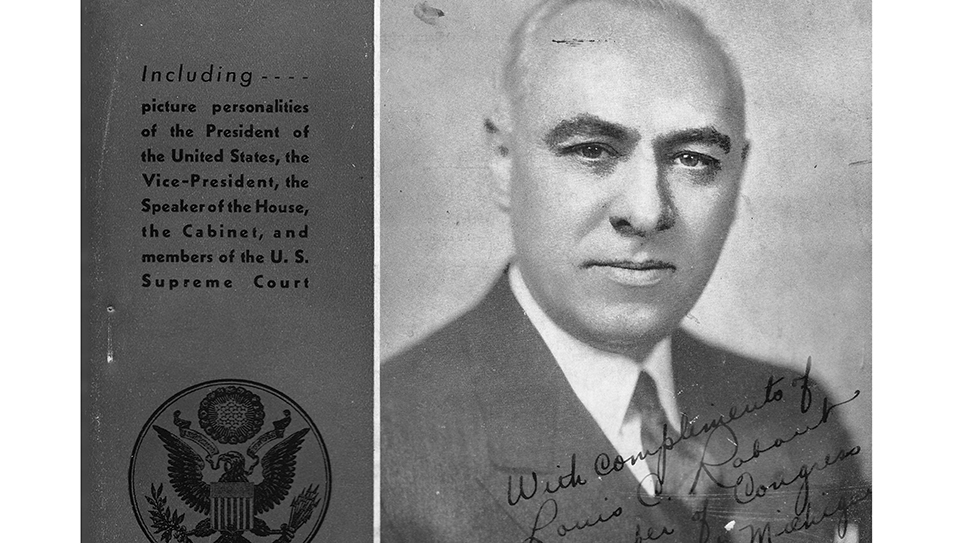The Gentleman From Iowa: George A. Wilson
By Ray Hill
George A. Wilson served as both governor of Iowa and U.S. senator from the Hawkeye State. Wilson embodied the sturdy Midwestern stock from which he came. George Allison Wilson was described by TIME magazine as “a rugged six-footer who likes to fish and work in his garden.” The most widely-read news magazine in the world in its day, TIME added Wilson was “an honest but unspectacular politico who has been in one ring or another almost ever since he got out of law school.”
George A. Wilson was a solid, kindly man who was a sort of “everyman” sort of fellow. The Des Moines Register recalled George Wilson as a man who had “a deep, sincere and consuming interest in people that kept him in public life for half a century…” Wilson’s “keen interest in people” and his ability to sympathize with the personal problems of others were part of the foundation of “his whole political philosophy.” Wilson served in all three branches of the government—judicial, executive and legislative—in his long career.
Wilson was indeed a veteran of public office, having been a district judge in Polk County (Des Moines) and a county attorney and having served in the Iowa State Senate for a decade before leaving office to run for governor. As befitting an attorney, throughout his life, George Wilson held a profound respect for the law. While serving as Iowa’s governor, Wilson focused on “efficiency and economy.” The Register editorial at his death noted, “As United States senator, he possessed a keen understanding of human relations and reactions that made his counsel and advice sought after by many of his colleagues.”
George A. Wilson won the GOP nomination for governor in 1936 and faced Lieutenant Governor Nelson Kraschel in the general election. 1936 was the high tide of Franklin D. Roosevelt’s popularity and the New Deal was at its peak; it was a terrible year for GOP candidates throughout the country. Despite the heavy Democratic headwinds, George Wilson lost the general election by only 2,431 votes, while Franklin Roosevelt was carrying Iowa by more than 100,000 votes.
Wilson’s good showing in a bad year for Republican candidates gave him the edge in claiming the right for a rematch with then-Governor Nelson Kraschel in 1938. A much better year for Republicans, Wilson reversed the results, beating Kraschel by just over 59,000 votes. During both the 1936 and 1938 campaigns, Democrats tried to use Wilson’s success as an attorney against him in the elections.
In 1940, Wendell Willkie, the GOP presidential nominee, stopped by Governor George Wilson’s office in Des Moines, where he met an abundance of fellow Republican chief executives and other officials prominent in America’s Corn Belt. The governors emphasized farm state concerns. At a luncheon, Willkie began his remarks by hailing his “fellow amateurs.”
George Wilson had promised to give old-age pensioners a raise should he be elected governor. That promise came back to haunt him as he wasn’t able to do as much as he had envisioned. Wilson encountered unexpectedly tough opposition inside the Republican primary from H. R. Gross, who would later make a name for himself as an economy-minded congressman, oftentimes called the “Watchdog of the Treasury.” Even then, Gross talked about saving tax dollars. H. R. Gross gained a considerable following as a news commentator on the radio. The campaign waged by the gubernatorial candidate was highly unusual at the time, rejecting invitations to events, making no public appearances, and confining his campaign to speeches made over the radio. The results stunned almost everybody. Gross lost by less than 19,000 votes out of more than 330,000 cast and quite nearly upset Governor Wilson inside the primary. Gross had carried 48 of Iowa’s 99 counties.
Senator Clyde L. Herring, a former governor himself, chortled from Washington, D.C., that Governor Wilson’s near loss in the GOP primary was a portent of things to come in the general election. The Democratic nominee, former Lieutenant Governor John Valentine, had endured an equally contentious and fractious primary as well. Wendell Willkie carried Iowa by more than 124,000 votes over President Roosevelt and his running mate, Henry A. Wallace, who was a native of the Hawkeye State. Governor George Wilson defeated John Valentine by just over 66,000 votes to win a second two-year term.
Senator Herring rightly presumed Governor Wilson was the likely Republican candidate to challenge him in the 1942 election. Herring seemingly never missed an opportunity to be critical of Wilson throughout 1941. Wilson announced on February 25, 1942, that he was running for the GOP nomination for the United States Senate. The governor promised to do all he could as Iowa’s senator in the successful prosecution of the war against the Axis powers and to help the United States to victory. The governor pledged himself “to the doctrine of utter defeat of our enemies.” Wilson said he would be a foe of “extravagance and waste” in government. So, too, would he support the farmers who were toiling mightily to produce food for the country during the Second World War. “My aim, as it has always been, is to achieve and assure for the farmers of Iowa their full share of the national income,” Wilson said.
Governor Wilson was opposed inside the Republican primary by Mark Thornburg, Iowa’s elected Secretary of Agriculture, who had been endorsed by Wendell Willkie. Two other candidates entered the primary contest, including future Congressman James Dolliver. Thornburg campaigned on the theme that the United States was obliged to help create the post-war world and must reject isolationism. Governor Wilson had the backing of Colonel Robert McCormick’s fiercely noninterventionist Chicago Tribune. Wilson won better than 51% of the primary vote against his three challengers.
After defeating Clyde Herring, George and Mildred Wilson moved to Washington, D.C. The new senator received excellent committee assignments, especially for one representing Iowa. Wilson had spots on the Agriculture and Armed Services Committees, as well as a seat on the Committee on Small Business.
During the Second World War, all three of Senator Wilson’s sons joined the armed services. None would allow their father to say or do anything to help with their advancement. Two of the three served again during the Korean War. The Wilsons also had a daughter. Wilson also sponsored a resolution during his first year in the United States Senate calling for the creation of the United Nations, two years before the organization came into being. Oddly, Senator Wilson, who was ahead of his time, never received a smidgen of credit for having pushed the idea before it came into being.
In 1944, Senator George Wilson underwent an operation for throat cancer following the extraction of his lower teeth. Evidently, Wilson never fully recovered, and his failing health affected his reelection campaign in 1948. Senator Wilson went to the Mayo Clinic and underwent extensive surgery, and all traces of the cancer were gone. At least that is what Wilson told the members of his family.
Sometimes, candidates encounter odds they simply cannot overcome, and that was true for George A. Wilson in 1948. What virtually every political pundit in the country thought would be a banner year for Republicans turned into a rout. Senator Wilson faced perhaps the most popular Democrat in Iowa in his reelection bid. Guy Gillette was the only Democrat ever to be reelected to the United States Senate from Iowa, and, after losing to Bourke B. Hickenlooper in 1944, Gillette was on the comeback trail.
Gillette looked like he had come out of central casting for the part of a United States senator, with distinguished features and white hair. One Washington writer had written of Gillette, “He is the only man who can attend a masquerade as a Roman senator and not have people think he was a person going to bed in his nightshirt.” The former senator had a large personal following and was an expert in meeting folks and winning their votes.
As Republicans controlled the U.S. Senate in 1948, the general election battle had national implications. With most everyone presuming Tom Dewey would beat Harry Truman for the presidency, much attention was given to the various Senate races across the country. The Dewey campaign lamented the fact that Senator Joe Ball seemed hard-pressed by the young mayor of Minneapolis, Hubert Humphrey. Senator E. V. Robertson appeared to be behind Democratic Governor Lester Hunt in Wyoming and Congressman Ross Rizley seemed unlikely to hold Oklahoma’s Senate seat for the Republicans; and it appeared Guy Gillette was gaining on Senator George Wilson. William M. Blair, a reporter for the New York Times, filed a story saying there was an even chance Gillette would defeat Senator Wilson.
It is difficult to determine whether his health hampered his ability to wage an effective reelection bid, but it appears George Wilson was unable to appear throughout much of the campaign. The senator did not make a major radio address until late in the fall campaign. In that same speech, Wilson promised to work with Dewey, should the New York governor be elected president, as most everyone thought he would be. “As a Republican, I shall stand pledged to support, rather than obstruct, the Republican program.”
Oregon U.S. Senator Wayne Morse came to Iowa to campaign for Wilson. Morse said Iowans should return George Wilson to the Senate because he was such a fine constitutional lawyer and drew his legislative proposals with care to be sure they were accurate. It seems highly probable that Senator Wilson’s campaign was amply financed, as he certainly had plenty of money for advertising. Gillette got substantial financial resources from unions, but likely spent much less than Senator Wilson. Organized labor was out in force against all the GOP incumbents, like Wilson, who had supported the hated Taft-Hartley right-to-work law.
Election Day saw Iowans split their tickets. Harry Truman carried Iowa by 12,000 votes, Republican William Beardsley easily won the governorship, and Guy Gillette beat Senator George Wilson by more than 160,000 votes.
Following his unsuccessful reelection campaign, Wilson did not linger in Washington but returned home to Des Moines. Wilson sold the family home, which had served as the governor’s mansion during his time as Iowa’s chief executive, and he and Mildred moved into a modest three-bedroom frame house. Wilson once again resumed his law practice.
The 69-year-old George Wilson’s health continued to seriously deteriorate, and the former senator took a turn for the worse on August 27, 1953. Wilson’s throat cancer had returned. The former governor and U.S. senator died on September 8, 1953. The funeral home was packed with the friends of George Wilson, who showed the former senator the same interest he had shown them in life.
The Des Moines Tribune believed the explanation for the large number of Democrats at the funeral of the former senator was that George Wilson “often treated political opponents like personal friends.” The newspaper recalled one of Wilson’s last acts had been to “buttonhole legislators and even newspapermen to see to it that a portrait of the late Clyde L. Herring, a Democrat, be placed on display with those of other governors. . .” Nelson Kraschel, a former opponent of Wilson’s, came from his home in Harlan, Iowa, to pay his respects to the senator’s widow.
After his death, several of George Wilson’s closest friends came together to compare notes and recalled his operation at the Mayo Clinic nine years previously. All of them remembered the same thing. George Wilson had quietly told them his doctors had said “there were two places” where the cancer could not be removed by any means at the time. The senator said that meant his days were numbered. The first time any family member heard that was when the former senator was taken to Mercy Hospital when Wilson became ill once again.
George A. Wilson was laid to rest in the fertile soil of the state where he had been born and served so well.
© 2025 Ray Hill







